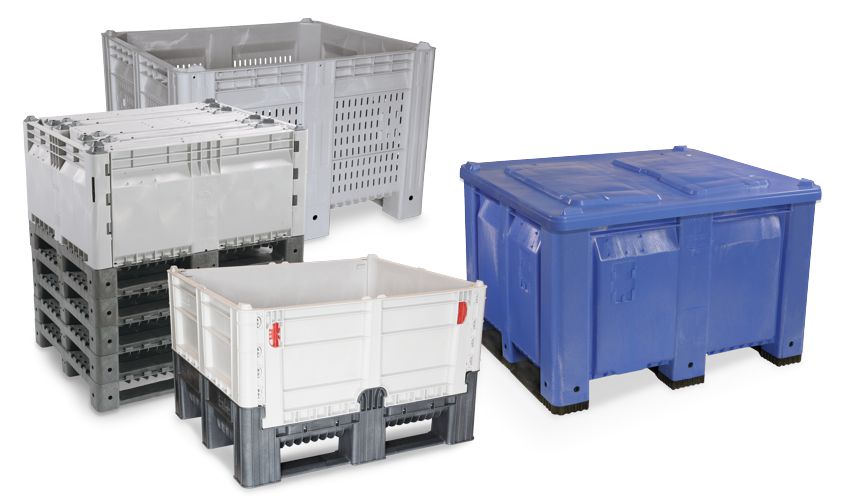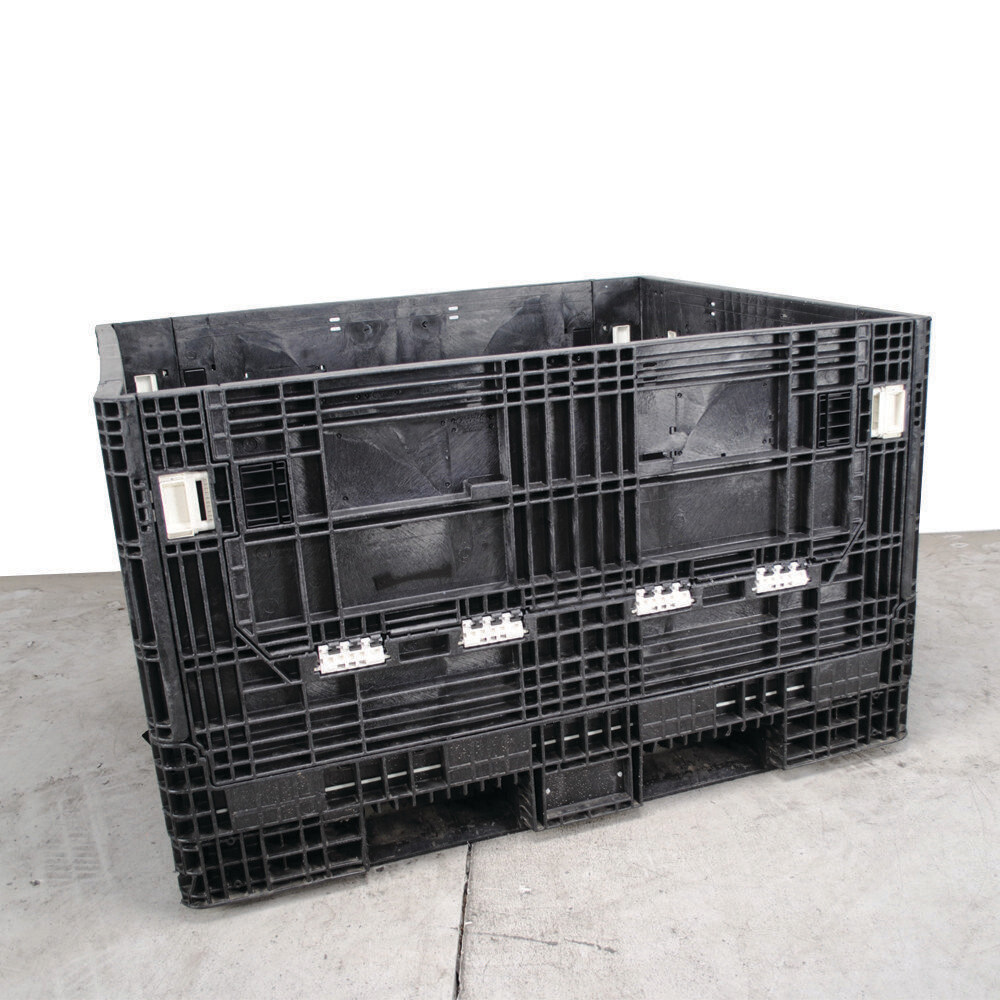Learn why refurbished bulk containers are trusted by logistics and storage experts
The Ultimate Guide to Picking the Right Bulk Containers for Your Business Requirements
Choosing the suitable mass containers is critical for any kind of business that depends on reliable logistics. Various sorts of containers exist, each created for particular materials and applications. Aspects such as dimension, material compatibility, and governing standards play a substantial function in this decision-making procedure. Recognizing these components can bring about enhanced operational effectiveness. Nonetheless, numerous organizations overlook essential elements that might enhance their total effectiveness and sustainability. What are these factors to consider?
Understanding Different Sorts Of Mass Containers
Bulk containers work as necessary tools for companies seeking effective storage space and transportation services. These containers come in different kinds, each made to satisfy specific functional requirements. One common type is the intermediate bulk container (IBC), which is ideal for granulated and liquid materials, using an equilibrium of ability and ability to move. Another popular choice is the bulk bag, or FIBC, suitable for dry, flowable products. These adaptable containers are lightweight and can be quickly transferred and kept. For larger products, inflexible mass containers are often used, supplying toughness and security for safe handling. Furthermore, there are customized containers customized for dangerous products, making sure compliance with safety regulations. Recognizing the distinct features of these bulk container kinds enables organizations to make informed decisions that enhance logistics and decrease prices. By selecting the appropriate container, firms can enhance their operational efficiency and enhance their supply chain processes.
Secret Product Considerations for Bulk Containers
When choosing bulk containers, it is vital to consider the materials made use of in their construction. Aspects such as resilience, chemical, and strength compatibility play a vital role in making sure the containers meet details functional demands. Furthermore, weight and mobility concerns can impact both effectiveness and transportation logistics.
Material Resilience and Strength
Durability and stamina are vital elements in selecting products for mass containers, as they directly affect the container's ability to stand up to different environmental conditions and managing procedures. Products such as high-density polyethylene (HDPE), polypropylene, and stainless-steel are commonly favored for their durable properties, supplying resistance to impact, abrasion, and temperature level changes. The selection of material likewise impacts the general life-span of the container; more powerful products typically lead to less regular substitutes, bring about set you back financial savings in time. In addition, the weight of the material can affect delivery expenses and simplicity of handling. Organizations should consider their specific functional environments and the possibility for damage to ensure peak longevity and strength in their mass container choice.
Chemical Compatibility Variables
Comprehending chemical compatibility is important for choosing mass containers, as the products utilized must resist the particular compounds they will certainly hold. Various variables influence compatibility, consisting of the chemical nature of the contents, temperature, and duration of storage space. Destructive chemicals might need containers made from stainless steel or specialized plastics that resist destruction. Furthermore, reactive substances can generate warmth or gases, requiring vented or pressure-rated containers. The selection of container material, whether metal, polycarbonate, or polyethylene, need to straighten with the chemical residential properties of the saved substances to avoid leakages or breaches. Eventually, a comprehensive assessment of these compatibility elements guarantees secure handling and storage, shielding both personnel and the setting while keeping item integrity.
Weight and Transportability Concerns
Picking bulk containers involves not only assessing chemical compatibility yet likewise taking into consideration weight and portability. Businesses need to evaluate the convenience of handling and transport to optimize efficiency. Light-weight products like high-density polyethylene (HDPE) or light weight aluminum can facilitate much easier movement and minimize shipping costs. Alternatively, heavier containers might offer boosted resilience yet can hinder movement, especially in environments needing frequent relocation. In addition, the layout of the container need to permit for hassle-free lifting and piling, ensuring ergonomic security for employees. Companies need to also consider the facilities available for transport; for example, containers suitable with forklifts or pallet jacks can enhance procedures. Eventually, the ideal equilibrium in between weight and portability straight affects operational performance and expense performance.
Sizing Your Bulk Containers for Optimum Effectiveness
When sizing bulk containers, companies have to meticulously assess the measurements needed to suit their details products. Additionally, weight capability is an essential aspect that influences performance and safety and security throughout transport and storage. Reliable sizing not just makes best use of space however likewise optimizes operational workflows.
Identifying Container Capacities
Choosing the best dimensions for bulk containers is important for making the most of effectiveness in storage space and transportation. Businesses have to analyze their specific demands, considering variables such as offered space, the nature of the items being saved, and the methods of transportation utilized. Precise measurements guarantee that containers fit ideally in stockrooms and lorries, minimizing thrown away space and reducing managing time. Requirement sizes can use convenience, but personalized dimensions could be required for one-of-a-kind needs or to accommodate particular items. Additionally, it is necessary to examine piling capabilities and availability, as these elements affect overall operational effectiveness. Eventually, the appropriate dimensions bring about improved company and structured logistics, benefiting the total performance of the company.
Weight Ability Considerations
Recognizing weight capability is vital for organizations intending to enhance their bulk container efficiency. The weight ability of a container directly influences storage space capabilities, transport logistics, and total functional costs. Picking containers with the suitable weight restrictions ensures that organizations can securely keep and move their items without risking damage or compliance issues. Straining containers can result in architectural failings, while underutilizing capacity outcomes in squandered resources. When choosing containers, it is important for companies to assess their product weights and think about any regulatory needs. In addition, variables such as the sort of material, intended usage, and environmental conditions need to likewise influence weight capacity decisions. By reviewing these aspects, services can improve performance and ensure a streamlined supply chain.
Governing Conformity and Security Standards

Regulatory conformity and safety and security requirements play a necessary role in the selection of mass containers for companies. Organizations has to guarantee that their containers satisfy different regulations set by local, nationwide, and international authorities. These standards commonly relate to product security, structural stability, and correct labeling, which assist prevent mishaps and assure the secure transport of items.
Furthermore, adherence to industry-specific standards, such as those from the Fda (FDA) or the Occupational Safety and Health And Wellness Management (OSHA), is important for business handling harmful products or food items. website Non-compliance can result in penalties, lawful issues, or damages to a service's credibility.
Companies need to also consider the container's compatibility with the products being stored or delivered to prevent contamination or chain reaction (used bulk containers). To sum up, comprehending and applying regulatory conformity and safety standards is vital for the liable and effective usage of mass containers
Sustainability Alternatives for Eco-Friendly Mass Containers

Firms are also discovering alternatives made from recycled materials, which not just save resources but also support the recycling market. Advancements in design allow for lighter containers that need much less energy to transport, better enhancing sustainability. By incorporating these green bulk container choices, companies can demonstrate their commitment to environmental stewardship while satisfying consumer demand for lasting practices. This shift not only assists the planet however can also improve brand track record and consumer commitment.
Cost-Effectiveness and Budgeting for Bulk Containers
While several organizations concentrate on sustainability, cost-effectiveness stays an important variable when selecting bulk containers. Organizations has to evaluate the preliminary acquisition rate, along with long-term functional costs, to guarantee monetary feasibility. Variables such as maintenance, reusability, and toughness play a considerable role in identifying overall expenses.
Buying high-quality containers might generate greater ahead of time costs yet can lead to cost savings via minimized substitute prices and reduced waste. In addition, organizations must think about transportation prices and storage space effectiveness, as these can impact the total budget plan.

Regularly Asked Concerns
Just how Do I Establish the Right Container for Hazardous Materials?
To establish the best container for hazardous products, one need to review compatibility with the substance, take into consideration the container's material, look for governing conformity, and assess capacity and safety features to ensure proper handling and storage.
Can Bulk Containers Be Personalized for Particular Products?
Yes, bulk containers can be tailored for particular items. used plastic containers. Numerous features, such as dimension, material, and layout, can be customized to meet unique demands, guaranteeing ideal security and performance for carrying and keeping different products
What Is the Typical Life-span of Different Bulk Container Kind?
The typical lifespan of bulk container types differs; plastic containers last 5-10 years, metal containers 10-20 years, and wood containers generally last 3-7 years, depending on usage, maintenance, and environmental problems.
Exactly how Should I Tidy and Maintain Bulk Containers?
To cleanse and keep bulk containers, one must frequently evaluate for damages, eliminate residue, clean with suitable detergents, wash completely, and guarantee proper drying out before storage space. Adhering to supplier guidelines improves durability and security throughout usage.
Exist Rental Choices for Mass Containers Available?
Yes, countless business use rental choices for bulk containers, offering versatility for organizations. These services can fit various demands, permitting firms to manage supply effectively without the dedication of purchasing containers outright.
Toughness and stamina are crucial elements in choosing materials for mass containers, as they straight affect the container's capacity to hold up against different environmental conditions and handling procedures. Recognizing chemical compatibility is necessary for choosing mass containers, as the materials made use of should resist the certain substances they will hold. Comprehending weight ability is essential for organizations aiming to enhance their bulk container effectiveness. Governing compliance and safety and security criteria play a crucial duty in the option of bulk containers for businesses. While several businesses concentrate on sustainability, cost-effectiveness remains an important element when choosing bulk containers.